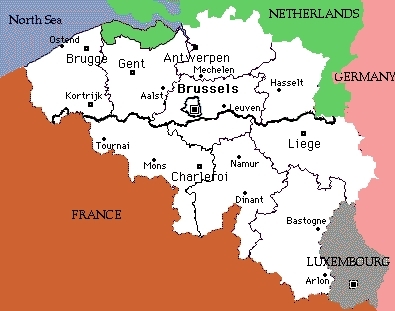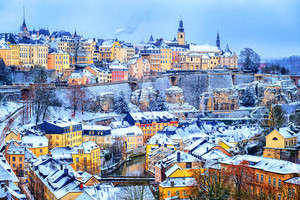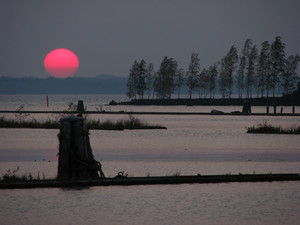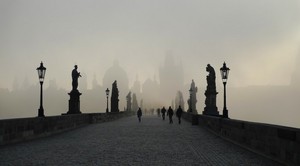The Belgian Prime minister has given up, he can't take the struggle anymore, but before I tell you more, you should read this text below (by the new york times) and read what they said in 2007.
Belgium has given the world Audrey Hepburn, René Magritte, the saxophone and deep-fried potato slices that somehow are called French.
But the back story of this flat, Maryland-size country of 10.4 million is of a bad marriage writ large — two nationalities living together that cannot stand each other. Now, more than three months after a general election, Belgium has failed to create a government, producing a crisis so profound that it has led to a flood of warnings, predictions, even promises that the country is about to disappear.
Radical Flemish separatists want to slice the country horizontally along ethnic and economic lines: to the north, their beloved Flanders — where Dutch (known locally as Flemish) is spoken and money is increasingly made — and to the south, French-speaking Wallonia, where a kind of provincial snobbery was once polished to a fine sheen and where today old factories dominate the gray landscape.
With the headquarters of both NATO and the European Union in Brussels, the crisis is not limited to this country because it could embolden other European separatist movements, among them the Basques, the Lombards and the Catalans.
Since the kingdom of Belgium was created as an obstacle to French expansionism in 1830, it has struggled for cohesion. Anyone who has spoken French in a Flemish city quickly gets a sense of the mutual hostility that is a part of daily life here. The current crisis dates from June 10, when the Flemish Christian Democrats, who demand greater autonomy for Flanders, came in first with one-fifth of the seats in Parliament. Since then, no one has been able to put together a coalition government.
On one level, there is normalcy and calm here. The country is governed largely by a patchwork of regional bureaucracies, so trains run on time, mail is delivered, garbage is collected, the police keep order. Officials of the former government remain in office, making decisions as if they had not been ousted. But a new government will be needed to approve a budget for next year.-- Elaine Sciolino, Sept. 21, 2007
The region 'Flandern' wants to be independent, but most people in the region 'Wallonia' don't.
The king has said no and they're now trying to solve the political problem because the prime minister wants to quit, and that's only after 4 months.
Let's see how it all turns out because they haven't found a solution yet. (15th of July 2008)
Sources: the Danish channel, DR1 and the New York Times.
Belgium has given the world Audrey Hepburn, René Magritte, the saxophone and deep-fried potato slices that somehow are called French.
But the back story of this flat, Maryland-size country of 10.4 million is of a bad marriage writ large — two nationalities living together that cannot stand each other. Now, more than three months after a general election, Belgium has failed to create a government, producing a crisis so profound that it has led to a flood of warnings, predictions, even promises that the country is about to disappear.
Radical Flemish separatists want to slice the country horizontally along ethnic and economic lines: to the north, their beloved Flanders — where Dutch (known locally as Flemish) is spoken and money is increasingly made — and to the south, French-speaking Wallonia, where a kind of provincial snobbery was once polished to a fine sheen and where today old factories dominate the gray landscape.
With the headquarters of both NATO and the European Union in Brussels, the crisis is not limited to this country because it could embolden other European separatist movements, among them the Basques, the Lombards and the Catalans.
Since the kingdom of Belgium was created as an obstacle to French expansionism in 1830, it has struggled for cohesion. Anyone who has spoken French in a Flemish city quickly gets a sense of the mutual hostility that is a part of daily life here. The current crisis dates from June 10, when the Flemish Christian Democrats, who demand greater autonomy for Flanders, came in first with one-fifth of the seats in Parliament. Since then, no one has been able to put together a coalition government.
On one level, there is normalcy and calm here. The country is governed largely by a patchwork of regional bureaucracies, so trains run on time, mail is delivered, garbage is collected, the police keep order. Officials of the former government remain in office, making decisions as if they had not been ousted. But a new government will be needed to approve a budget for next year.-- Elaine Sciolino, Sept. 21, 2007
The region 'Flandern' wants to be independent, but most people in the region 'Wallonia' don't.
The king has said no and they're now trying to solve the political problem because the prime minister wants to quit, and that's only after 4 months.
Let's see how it all turns out because they haven't found a solution yet. (15th of July 2008)
Sources: the Danish channel, DR1 and the New York Times.






















